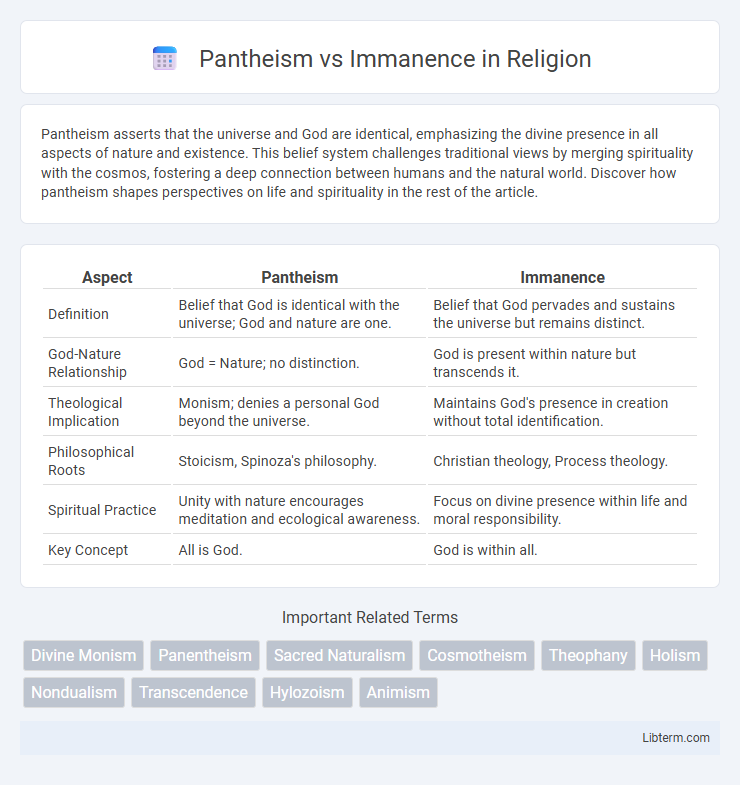Pantheism asserts that the universe and God are identical, emphasizing the divine presence in all aspects of nature and existence. This belief system challenges traditional views by merging spirituality with the cosmos, fostering a deep connection between humans and the natural world. Discover how pantheism shapes perspectives on life and spirituality in the rest of the article.
Table of Comparison
| Aspect | Pantheism | Immanence |
|---|---|---|
| Definition | Belief that God is identical with the universe; God and nature are one. | Belief that God pervades and sustains the universe but remains distinct. |
| God-Nature Relationship | God = Nature; no distinction. | God is present within nature but transcends it. |
| Theological Implication | Monism; denies a personal God beyond the universe. | Maintains God's presence in creation without total identification. |
| Philosophical Roots | Stoicism, Spinoza's philosophy. | Christian theology, Process theology. |
| Spiritual Practice | Unity with nature encourages meditation and ecological awareness. | Focus on divine presence within life and moral responsibility. |
| Key Concept | All is God. | God is within all. |
Understanding Pantheism: An Overview
Pantheism identifies the divine with the universe, asserting that God and the cosmos are identical, emphasizing an all-encompassing presence. Immanence relates to the inherent presence of the divine within all aspects of the material world, highlighting the closeness of God to creation. Understanding pantheism requires recognizing its view that divinity is not separate but fully integrated within the natural order, contrasting with traditional theistic transcendence.
Defining Immanence in Philosophy and Religion
Immanence in philosophy and religion refers to the inherent presence of the divine within the material world and all aspects of existence. It contrasts with transcendence by emphasizing that the sacred or ultimate reality is not separate from the universe but pervades every part of it. Pantheism aligns closely with immanence, asserting that God or the divine is synonymous with the cosmos, manifesting in everything that exists.
Historical Roots: Pantheism and Immanence Across Cultures
Pantheism traces its historical roots to ancient philosophies such as Stoicism and Hinduism, where divinity is equated with the universe itself, emphasizing the unity of all existence. Immanence, found in diverse traditions including Spinozism, Indigenous beliefs, and certain strands of Christianity, highlights the presence of the divine within the natural world and human experience. Both concepts intersect in their challenge to transcendence, underscoring a worldview that sees the sacred as inherent rather than separate from reality.
Key Philosophers of Pantheism and Immanence
Baruch Spinoza is a central figure in pantheism, asserting that God and nature are identical, emphasizing a unified substance underlying all existence. Friedrich Schleiermacher and Georg Wilhelm Friedrich Hegel contributed to the philosophy of immanence, highlighting the presence of the divine within the material world and consciousness. These key philosophers shaped the discourse by exploring the relationship between divinity and the universe, with pantheism focusing on an all-encompassing God and immanence stressing the divine's indwelling presence.
Pantheism vs. Immanence: Core Similarities
Pantheism and immanence both emphasize the presence of the divine within the natural world, highlighting a unity between God and the universe. Both concepts reject transcendence by viewing divinity as inherently integrated within all aspects of existence. This shared perspective underlines a spiritual framework where the sacred is immanent, manifesting through nature and reality itself.
Critical Differences Between Pantheism and Immanence
Pantheism identifies divinity with the universe itself, asserting that God and the cosmos are identical, whereas Immanence emphasizes the inherent presence of the divine within all things without equating God to the universe. Pantheism typically implies a holistic unity where everything collectively forms a single divine entity, while Immanence highlights a continuous divine presence permeating creation but maintaining distinctness from it. Critical differences lie in Pantheism's metaphysical identification of God with the totality of existence, contrasting with Immanence's philosophical focus on the divine's intrinsic indwelling presence in particular beings and processes.
Theological Implications of Pantheism
Pantheism posits that God and the universe are identical, implying that divinity pervades all of existence, which challenges traditional theistic views of a personal, transcendent deity. This theological stance often negates the distinction between creator and creation, leading to debates about divine immanence versus transcendence in religious philosophy. The implications extend to ethical and ontological frameworks, where the sacredness of nature is emphasized, reshaping moral responsibility and spiritual practice in pantheistic belief systems.
The Role of Immanence in Modern Spirituality
Immanence plays a crucial role in modern spirituality by emphasizing the divine presence within the material world, contrasting with traditional theistic views that place the divine outside or above creation. Pantheism aligns closely with this concept, as it identifies God with the universe, fostering a spiritual connection to nature and everyday existence. Contemporary spiritual movements often incorporate immanence to promote holistic well-being, eco-consciousness, and a sense of unity with the cosmos.
Pantheism and Immanence in Contemporary Thought
Pantheism asserts that the divine exists in all aspects of the universe, identifying God with the cosmos and emphasizing a unity between the sacred and the natural world. Immanence, central to contemporary thought, refers to the inherent presence of the divine within the material world, rejecting transcendence and highlighting a continuous divine involvement in existence. Current philosophical and theological discourse explores immanence as a framework for understanding spirituality and ethics without reliance on supernatural transcendence, often intersecting with ecological and existential themes.
Choosing a Perspective: Personal Belief and Worldview
Choosing between Pantheism and Immanence influences one's personal belief system and worldview by shaping the understanding of divinity and its relation to the universe. Pantheism equates God with the cosmos, emphasizing an all-encompassing divine presence, whereas Immanence highlights the divine existing within and throughout the material world without transcendence. This distinction guides individuals in interpreting spirituality, ethics, and their connection to nature and existence.
Pantheism Infographic

 libterm.com
libterm.com